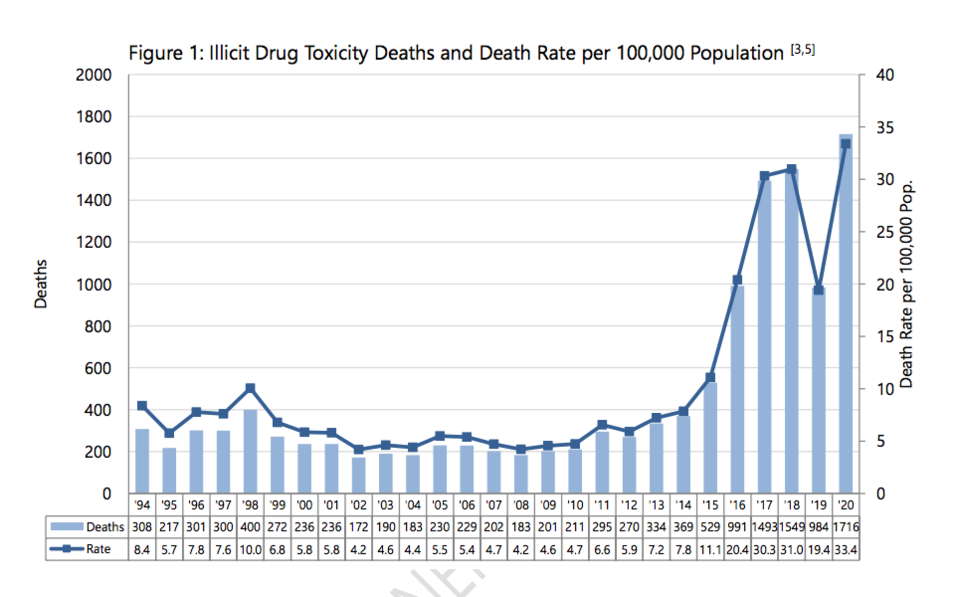Sechelt suffered from an outsized number of overdose calls last year, according to data from BC Emergency Health Services.
Paramedics responded to 87 overdose calls in 2020, compared with 41 in 2019. It’s far higher than the previous four years. In 2016, paramedics faced only 25 calls, for example.
Gibsons, on the other hand, saw a drop in calls to 24 in 2020 compared to 32 in 2019.
The statistics come as the province revealed a stark picture of how seriously the opioid overdose crises worsened last year.
On Feb. 11 the province released annual figures for fatal overdoses caused by toxic illicit drugs, showing 2020 was the worst year on record, with fentanyl largely to blame as it’s detected in most cases (84 per cent).
Last year 1,716 people died due to toxic drugs in the province, a 74 per cent increase from 2019, according to the BC Coroners Service.
More people died from toxic and illicit drugs than from motor-vehicle crashes, homicides, suicide and prescription-drug related deaths combined.
The vast majority (81 per cent) of those deaths were males, and 69 per cent were between the ages of 30 and 59. Most deaths (56 per cent) occurred in private residences, while 28 per cent occurred in other residences such as supportive housing, shelters and hotels.
Vancouver, Surrey and Victoria saw the highest death counts. North Shore/Coast Garibaldi, the health service delivery area in which the Sunshine Coast is located, saw deaths nearly double to 46 in 2020 from 26 in 2019. There were 42 deaths in 2018 and 45 the year before.
Despite those increases, last year the health service delivery area still had the second lowest death rate in the province at 15.2 deaths due to toxic illicit drugs per 100,000 people.
Hidden in that low death rate, however, is a higher impact in individual communities. Powell River, for example, which is part of North Shore/Coast Garibaldi, suffered 25 deaths over the past two years, putting it in the top 15 local health areas by death rate (39.5 deaths per 100,000 people).
With the release of the annual statistics came recognition by authorities that COVID-19 health restrictions have contributed to the worsening problem.
“The impacts of COVID-19 highlighted the immensely precarious situation of those experiencing problematic substance use in our province,” said Lisa Lapointe, chief coroner, in the Feb. 11 release.
“Decades of criminalization, an increasingly toxic illicit drug market and the lack of timely access to evidence-based treatment and recovery services have resulted in the loss of thousands of lives in B.C.,” she said, adding “urgent change” is required.
Provincial health officer Dr. Bonnie Henry also used some time during her Feb. 11 COVID-19 media briefing to address the ongoing crisis.
“Losing more than 1,700 people to the overdose crisis is devastating, and sadly there is no vaccine that will help to end it soon,” said her joint statement with Health Minister Adrian Dix following briefing.
“To the parents, friends, partners and communities who have lost loved ones, we offer our condolences. We remain committed to supporting people who use drugs and are doing everything we can to address the dual health crises affecting our province.”



